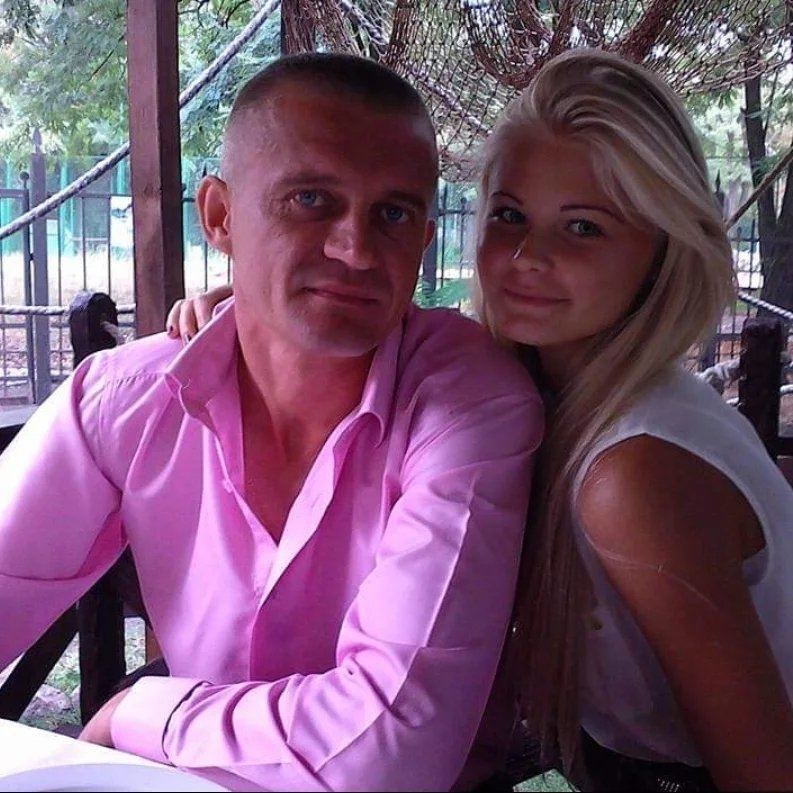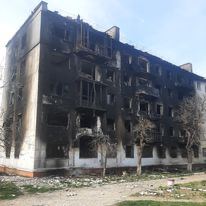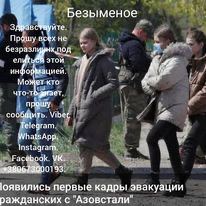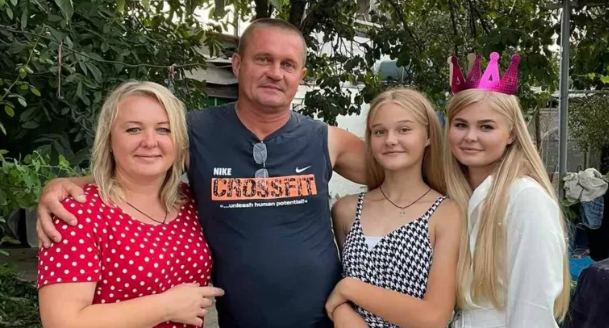‘We have already found 24 pretrial detention centers and prisons from Belgorod region to Krasnoyarsk region. The Russian authorities do not allow Ukrainians to have any contact with the outside world, Ukrainians are kept in information vacuum. Russian officials are lying about the fact that the kidnapped citizens of Ukraine are not in those places where they definitely are. We know about cases when these people are tortured, beaten, forced to sing the national anthem of the Russian Federation. All this is a violation of the norms of international humanitarian law, and in some cases are the crimes against humanity’, says the member of the Expert Council of the Center for Civil Liberties Mykhailo Savva.
Mariana Checheliuk is a native of Mariupol, born on January 5, 2000, who was deported along with her underage sister during the evacuation from the Azovstal plant. She is still being illegally held captive by the Russian military and special services.
‘Bukvy’ spoke to Mariama’s father Vitalii.

– Please tell us how your daughters lived before the war, where did they study, what did they do?
Mariana and Alina were born in Mariupol. After finishing school, Mariana went to study at the Kharkiv Police Academy. After graduating, she returned to her hometown and entered the police school. Subsequently, she began working as an investigator in Zhovtnevyi district of Mariupol, where she performed her duties for about a year, until February 24. She was a zoo volunteer, she loved dogs very much, before and after work she cooked dog food and fed street animals. The younger daughter, Alina, was in the 9th grade when a full-scale war began.
– Did you believe in a full-scale Russian invasion and the besiege of Mariupol?
There wasn’t even a thought. When the first shelling began on the outskirts of the city, we thought it would last for a couple of days, like in 2015. However, everything went different…
– How did you survive in the besieged city? Was the shortage of food and water critical?
Our five-story apartment building in Livoberezhnyi district, on Peremohy Avenue, burned down on March 30 when a Grad rocket was hit. There was no basement in the building, so for some time we hid in the storage of the House of Culture together with other civilians. There were about five hundred of us. It is not far from the Azovstal plant, which was mercilessly bombed from aircraft every 4 minutes, bombarded from the sea and neighboring areas. During the first week of the invasion, we still had our own supplies of food and water, and then we had to search for everything, get it under constant fire. Near Azovstal, there was a bread factory, to which we ran for water, there was also a water tank there. Throughout her stay with us, Mariana helped the elderly, cooked and fed civilians.

– Was there a possibility to evacuate?
We were going to leave immediately, but already in the first week all the roads were blocked. It was very risky to move around the city. Columns with civilian cars were shot. I was very worried about my daughters and wife, so we tried to somehow survive in Mariupol together.
– The four of you were together until March 25. How did it happen that you ran to the bread factory, and your daughters ran to Azovstal?
The place where many civilians were collecting water near Azovstal was constantly shelled by the Russian army. Mariupol people died there every day. We saw corpses of civilians, a lot. I don’t even want to mention it… The dead were buried there on the spot. During the next shelling, the daughters escaped to Azovstal, but my wife and I did not have time and remained on the other side near the bread factory. There was no communication since the beginning of March, so we could not get in touch with Mariana and Alina. The daughters miraculously managed to call us once during their stay at Azovstal to let us know that they were alive. Each dropped bomb and explosion at the plant was like a knife to our heart. The whole family, especially my wife, is still in a very severe condition.
– According to you, the representatives of the UN and the Red Cross promised to take Mariana and Alina to Zaporizhzhia during the evacuation of civilians from the plant, but they took them to the village of Bezimenne for ‘filtration. How did it happen?
Many times, the evacuation was interrupted due to Russian provocations. But on May 1, a humanitarian corridor was organized. Along with Alina and Mariana, hundreds more civilians came out of the shelter. The UN and the Red Cross really promised to take them to Ukraine-controlled territory, to Zaporizhzhia. However, they were taken to the occupied Bezimenne, arguing that the people had to go through ‘filtration’, and later they would be released. The bandages on the sleeves of the civilians were white and the removal to the east was planned in advance.

– You managed to free younger daughter Alina, didn’t you?
Yes. The occupying authorities allowed Alina to call us and informed us that if we do not pick up our daughter within a day, she would be transferred to a boarding school because she is a minor. On the same day, we quickly took our younger daughter from Bezimenne. Regarding the older daughter, we were promised to take Mariana in two days, then in a week, later the promises changed to a denial of the fact that she is being kept by Russians.
– What does Alina say as she is the last person who saw Mariana?
Alina says that on May 1, around 2 pm, they passed the ‘filtration’. Then they were settled in a tent and at 9 pm the same day, a representative of the FSB came to them and took Mariana away. Alina cried and asked him to leave Mariana alone, but he only threatened the younger girl with boarding school. As it turned out later, Mariana was forced into a car and taken to Donetsk.
– When did you last hear from Mariana?
During 8 months of captivity, there was only one phone call. During a short conversation, the daughter only had time to ask what happened to her sister Alina. I got the impression that the Russian military threatened her regarding the sister. Mariana said that she loves us very much and is looking forward to meeting us. And then she started to cry, the connection was instantly cut off. She was not allowed to call anymore. We can’t understand why she is not allowed to speak to us. She is not a terrible criminal. She is a civilian resident of Ukraine.

– Is she kept in captivity as a civilian or as an employee of the law enforcement?
We don’t know… The Russian side told us that she is being filtered and withheld because she is an investigator. But during the war, she was a civilian and was not in the service. To this day, I cannot understand why my daughter was detained. We don’t know how the Russian military found out that she worked as an investigator, whether they had some lists or other indications.
– According to witnesses and rumors, she was held in solitary confinement for two months in Donetsk, then transferred to Olenivka prison, and later to Taganrog pre-trial detention center. Do you know the conditions of detention and current whereabouts of your daughter?
On October 17, during the prisoner swap, we learned that some of them had seen our Mariana in Taganrog. According to them, she helped the prisoners as much as she could. But the daughter suffers from leg and back pain. Prior to that, at the time of the terrorist attack, she had been in Olenivka for 4 months, and for some time in the Donetsk detention facility. I have to say, these are just words. We have no direct confirmation of Mariana’s past and present whereabouts.
– Is your daughter on the lists for prisoner swap?
Yes, she is. We finally achieved it. But the Russian side is still refusing to exchange her.

– You have repeatedly contacted law enforcement agencies of Ukraine, the Red Cross, the UN, the SBU of Ukraine, the government, the Joint Center for the Search and Release of Prisoners in Geneva, ‘so-called ‘DNR’. What are the responses from the Ukrainian authorities and the self-proclaimed Russian authorities?
We addressed the self-proclaimed government in Donetsk region. There were only refusals, they did not answer most of the letters. Some of their employees deny that she is under their control. On the part of our authorities, there is a result – Mariana is on the lists for swap. This is all we can do for today.
– How can the society today help bring Mariana back? It is known that the Ukrainian and international community supports your family, organizes rallies to contribute to the liberation of the girl.
This is true. The world knows about us. People contact us, ask for permission to use Mariana’s photos and story, make videos with her photos on social networks, distribute our posts about the captive daughter. Among them there are people from Russia. We are grateful to everyone. Please, do not be silent about our grief. Together we can bring all our people home. We sincerely believe in it!

 Radzivon “Gena” Batulin: Belarus is turning into North Korea
Radzivon “Gena” Batulin: Belarus is turning into North Korea 




